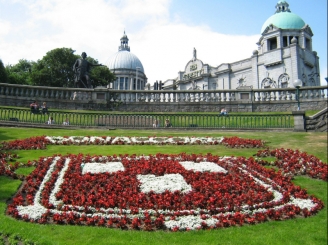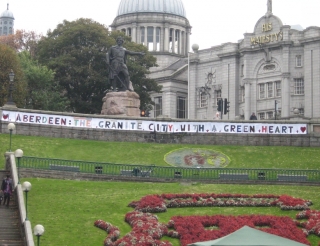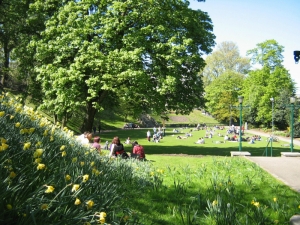The Union Terrace Gardens controversy is showing no signs of going away. The City Garden Project (CGP) has again appeared on the front pages of the Press and Journal. ‘Why now?’ is the question that has been asked. Mike Shepherd suspects it has something to do with the recent retirement of Sir Ian Wood.
On being asked by the BBC what he was going to do next, Sir Ian said he would spend a lot of time over the next two or three years on his philanthropic activities. Unfortunately, he still sees the City Garden Project as one of these.
Surprisingly quiet on the topic at the moment are local SNP politicians, not normally a reticent bunch.
Perhaps they have a good reason to keep quiet as there is a scandal, already in the public domain, just waiting for the right moment to explode and grab attention on the national stage.
After Trump and the EU legal advice debacle, the last thing Alex Salmond needs at the moment is any further suggestion that his government is becoming less than scrupulous in its affairs.
What is this scandal? Rewind to the time when questions were being asked about how the City Garden Project was to be paid for.
Sir Ian Wood and an anonymous businessman were offering £55m to part-fund a range of city centre projects that would have cost £182m in total. There was a proposal to find £92m of this sum through public borrowing as part of a Tax Incremental Financing (TIF) scheme.
TIF is a mechanism by which a municipal authority borrows money to invest in an infrastructure project and is allowed to retain the business rates from any new businesses starting up as a result of the investment. These sums would then be used to help pay back the initial borrowings. TIF is popular in the US but has never been tried in the UK.
The Scottish Government was keen to give it a go and authorised an initial pilot scheme of six projects to see if TIF would work in Scotland. The responsibility was given to the Scottish Futures Trust, a semi-public body which describes itself on its website as:
“An independent company, established by the Scottish Government in 2008, with a responsibility for delivering value for money across all public sector infrastructure investment. SFT operates at arm’s length from the Government but works closely with the public sector to seek and deliver improved value for taxpayers.”
The Government asked the SFT to develop a means for assessing any applications for TIF funding, stating:
“SFT will need to be convinced, on behalf of Ministers, that the economic case for a particular TIF is clear.”
http://www.scotland.gov.uk/Topics/Government/Finance/18232/TIF
The SFT Chief Executive announced any submitted proposals would be scored and assessed by two SFT representatives and two from the government. The results would be collated and a score agreed by the four reviewers. The proposals with the highest scores would be recommended for progression to a full TIF business case (letter published on the SFT website, 23 June 2011).
Fifteen Scottish councils, including Aberdeen, submitted sixteen infrastructure proposals to the SFT to apply to be one of six TIF pilot schemes.
A business magazine later leaked details on the top six projects to be recommended for the pilot. Aberdeen was not on the list, yet then Scottish Government Infrastructure Secretary Alex Neil went ahead and invited Aberdeen City Council to further develop its TIF submission anyway. When I queried this with him at the time, he confirmed that Aberdeen was indeed one of the six projects. This looked suspicious.
Sunday Herald Deputy Business Editor Steven Vass began to take an interest in the story and submitted a Freedom of Information request for the SFT’s ranking of the sixteen TIF proposals. The SFT were most reluctant to release these, refusing to provide the listing until they were effectively ordered to do so by the Information Commissioner.
On 12 October this year, The Herald reported the findings. Aberdeen had been ranked only tenth out of the sixteen.
The submission by Renfrewshire Council to develop Glasgow Airport and the surrounding enterprise zone as a major hub for renewable manufacturing had been rejected, despite being ranked fourth. Aberdeen’s application looks to have replaced it.
http://www.heraldscotland.com/news/home-news/snps-business-ties-face-scrutiny.19138461
Renfrewshire Council appealed when the ranking list was revealed, only to be told last week by Deputy First Minister Nicola Sturgeon that the Government would not change its mind on the issue.
http://www.eveningtimes.co.uk/news/fury-as-snp-rejects-airport-enterprise-106198n.19299603
Details of the ranking have been made public by the government. Aberdeen scored a lowly 4/10 in three categories: private investment, economic impact and regeneration impact. In other words, the application was economically dubious.
http://www.scotland.gov.uk/Topics/Government/Finance/18232/FOI/TIFScoring
Despite this damning indictment of the Aberdeen business case, the government has insisted Aberdeen will not receive any TIF funding unless any application includes the City Garden Project.
Scottish politicians were under no illusions about what had happened. Steven Vass reported Alex Salmond was facing questions about his relationship with ‘leading businessmen’ after ‘his Government overruled officials’ advice to enable Sir Ian Wood’s controversial Aberdeen City Garden Project to go ahead.’
Labour MSP Lewis Macdonald said:
“On the basis of what we have seen with Mr. Trump this week, you have to wonder what Mr Salmond thought he was going to get.”
Scottish Liberal Democrat Leader Willie Rennie was also reported to have said that the decision was unacceptable and could have left Aberdeen tax payers exposed to considerable risk.
The SNP appears to have a hidden agenda for the CGP, but its existence is becoming more and more obvious.
The nobbling of SFT rankings was carried out in spite of a government specification for assessment ‘that the economic case for a particular TIF is clear’. Despite its sub-par score for economic and regeneration impact, the Aberdeen project was moved from tenth to fourth by ministers, ostensibly on a geographical basis but as we have seen, not on an economic basis.
Yet, one other Scottish government body had recognised problems with the Aberdeen TIF application. AuditScotland reported last February that it had concerns,
‘If approved, a key risk will be the affordability of the project and its impact on the council’s finances should TIF funding fail to provide the necessary additional non-domestic rate income for the city.’
http://local.stv.tv/aberdeen/news/local-democracy/29500-long-term-risk-warning-for-city-garden-project/
I believe the SNP is courting Sir Ian Wood for political reasons and that the CGP has been central to this aim. Sir Ian talked about the 2014 Scottish independence referendum in a recent BBC interview.
While endorsing neither the Yes or No camps, he nevertheless has a huge concern that part of the discussion revolves around the question, ‘Do we like England?’
He could potentially act as a spokesman for the oil industry in opposition to Scottish independence
Sir Ian emphasises: ‘I am a British citizen,’ and hopes the referendum debate will focus on the right reasons for making the decision. He is concerned about the impact of the referendum on short term investment in the North Sea, as topics under open discussion could include oil tax regime, decommissioning agreements and the division of reserves between Scotland and the rest of the UK.
On being asked where he stands on the referendum, his answer is:
“If I think I could make a useful contribution to the debate, I will at the right time, but not yet.”
http://www.bbc.co.uk/news/uk-scotland-scotland-business-20140345
I suspect Alex Salmond will be hoping Sir Ian will most certainly not make a contribution to the debate. He could potentially act as a spokesman for the oil industry in opposition to Scottish independence. Being an Aberdonian and a Scot could be deemed to lend credibility to any position he may take.
It won’t be easy to keep the billionaire happy, and smoothing the way for the CGP now looks an unlikely proposition. The Aberdeen City Council administration is totally opposed to his project, the business case has been shown to be somewhat dubious and if the Aberdeen TIF is ever resurrected as a possibility, several Scottish councils will be on the warpath, with good cause.
It’s a mess for Alex Salmond and the SNP, and one for which they only have themselves to blame. Aberdeen’s heritage should never have been a sacrificial pawn in their aspiration for Scottish independence.
- Comments enabled – see comments box below. Note: all comments will be moderated.



Why’s everyone so desperate for a conspiracy – what’s wrong with the Scottish government’s explanation???
“Ministers nonetheless wished to invite Aberdeen City Council to submit a full TIF business case, provided that public support for the Union Terrace Gardens project could be demonstrated. Aberdeen’s project was chosen to ensure good geographical spread of TIF pilots. It was also selected because of the potential of the scheme to lever in £55 million of private funding immediately, representing 40% of the estimated total cost of the City Garden Project (£140 million). The potential to lever in such levels of guaranteed private funding for the creation of the assets made this project unique amongst those for which bids had been received.” http://www.scotland.gov.uk/Topics/Government/Finance/18232/FOI
What a load of cobblers, I bet you think America blew up the twin towers. I voted for UTG redevelopment, but no way would I vote for independence and no way would this have encouraged me to do so.
Catherine
A geographical spread was not one of the criteria for evaluating TIF business cases. They were to be judged on economic robustness and for a good reason too. If the business case was poor then the municipal council taking the risk of borrowing would be left in debt.
The public were not informed that the Aberdeen business case was dubious. They should have been.
This is definitely being used for point scoring by snp opponents. Many a complaint we have heard about the unfair share of Scottish funding Aberdeen and Aberdeenshire receive from the Scottish government but when the government do something to ensure funding for this area where otherwise there would have been none the same politicians complain. Do they want funding or just to score points.
Mike,
Give it a rest, the people of Aberdeen voted for the CGP to go ahead, your conspiracy theory stories won’t alter that fact, we wanted it!
How on earth you can link that with a SNP referendum vote is beyond me.
btw If you thought the CGP vote was not fair why did you attend the count?
George, you do not speak for everyone, so kindly refrain from applying the royal “we” to your exclamations. Thousands did not want it, but unfortunately CGP supporters without fail experience extreme difficulty when it comes to accepting evidence that does not support their point of view. “Blinkered” is the word I’m looking for…
George, the Scottish Futures Trust decided the Aberdeen TIF was substandard and that the economic benefits scored 4/10. They are part of the Scottish Government and the assessment was made well before the CGP referendum.
This was information that should have been put in the public domain before the referendum. The people of Aberdeen were not provided with all the information that they should have to inform their vote.
We now know that the City Garden Project does not make any business sense. This validates the August 22 council decision to reject the TIF business case.
Ben, I am not anti SNP or indeed a member of any political party. I can tell you that I once voted for the SNP although not any more.
I have written the article in good faith. It is a matter of public record that the TIF ranking was interfered with, that ‘geographic spread’ was not a criterion for assessing TIF applications and that for whatever reason the SFT were most reluctant to reveal the ranking.
The judgement that the Aberdeen TIF was substandard was kept out of the public eye. This is poor government. There is a lack of transparency and accountability over what happened.
My opinion that Alex Salmond is trying to keep SIW sweet is speculative but consistent with the facts, and to my mind utterly believable.
When will folk get it into their heads that the question of Independence is not about the SNP, is not about Alex Salmond, and it’s certainly not about a bit of green space in the centre of Aberdeen.
Yes, Independence has always been an SNP policy, of course, but the issue has moved on from that now. We are getting the referendum. It’s about the future of the nation for centuries to come. Now is the time we should all move on from the petty personal attacks on individuals, and move on to concentrate on the important issue of an entire nation’s future.
I was at the first Yes Scotland Aberdeenshire meeting last weekend. Chair of the meeting was an Englishman. A Frenchman and an Italian spoke from the audience. There were members from the Labour Party who also spoke. All of whom were of the opinion Scotland would do better as an Independent nation.
As emotive a subject UTG’S has been to the minority of Aberdeen residents, it has nothing to do with the future of our nation. It’s minuscule by comparison.
With your MSM tendencies, you should get a job with the BBC mate.
I have to agree with Mike Shepherd. Not only did the figures not add up, according to a leading economist, was the £140m price tag realistic in the first place?
Yes, the much vaunted referendum did produce a result in favour of redevelopment, but only after a blizzard of misleading, indeed dubious, figures were bandied about by proponents, not to mention the dodgy “artists impressions.” Rules for referenada are clear. Each side should have equal funding to put their point across. The was sidestepped by proponents, effectively annulling the referendum in any other circumstance.
We should also remember that the public’s views were disregarded in every other “consultation” when the desired result was not achieved. The Granite Web design was rejected, outright, by the public, was it not George?
All in all, the whole saga was an affront to democracy.
Agree Ron,
Probably the most shocking episode of the referendum was the bogus £20 million Art Gallery grant that the TIF funding was supposed to unlock. It was pure fiction. It never existed, Yet as far as the CGP propaganda was concerned, it was a reality and was sold to the public as such.
There was such a serious short fall in cash, £15 million from the private sector and the £20 million bogus grant that never existed, the economics of the project was a total basket case. And it still is.
Mike, we won. Many of us who campaigned against UTG are independence supporters. Many of us voted labour at the council elections not because of a new found love of the union, but because we knew they would put a stop to UTG.
We realised it would mean no Don bridge and the pedestrianisation of Union St would be back on the agenda. The same Labour guff that got them booted out of the toon hoose before.
Now if you want to support the union, do so – that is your right. UTG is not a reason to vote for or against independence. Please stop trying to make it one.
Mike,
I hope you enjoy this Labour term in office in Aberdeen as it will be its last for many a year, the huge number of people who voted for the CGP will not forget the overturning of their democratic vote. I’ve never voted in council elections, to me they’re all self serving failed businessmen playing at big boys politics, you can be sure I’ll be at the next election to get this lot out, I know for sure I won’t be the only one.
The CGP will happen, too many people are for it for it not to go ahead, you’ll get another chance to bang that desk and cry foul play when you lose.
George:
It is generally accepted that the referendum was totally imbalanced and the public were dramatically misled. Please don’t try to convince anyone otherwise because you will make yourself a laughing stock.
In regard to independence: I firmly believe that it would benefit Scots and consequently voted SNP since Margaret Thatcher’s era. Prior to that I simply didn’t vote. I voted for Labour in the local government election as they were the only party which represented my views in regard to UTG.
UTG is a matter local to our city and intervention, by either Holyrood or Westminster politicians, is unwarranted. It is certainly not a matter that should pertain to independence, or otherwise, of Scotland as a whole..
Generally accepted….by the losing side! How little faith you have in the Aberdeen people to weigh the pros and cons, shame on you for thinking you know better.
I’ve not changed my mind on which way I’d vote nor have those I know who voted for the CGP. If the likes of Mike Shepherd didn’t believe it was fair then they wouldn’t have went to the count and leered at the prospect of a majority, the sour grapes only began when they lost. If he’d boycotted and called foul before the count then he may have garnered a little respect.
*POST AMENDED. George, I will restore the removed sentence if you can specify which ‘lies’ you are referring to, and if we/you can establish that a specific group or individual is indeed guilty of lying. Also ‘anti progress people’ does not specify or define any group or set of individuals therefore the sentence removed is either meaningless, groundless, defamatory or unjustifiably inflammatory and therefore Aberdeen Voice will not bear responsibility for its publication. – Moderator.